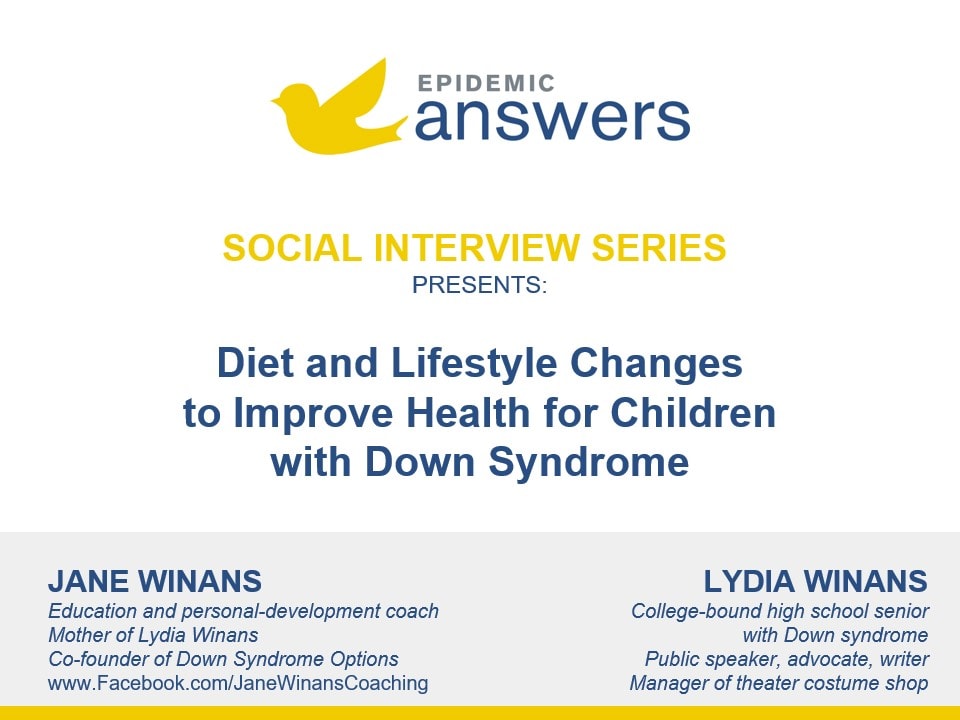We interviewed Erica Peirson ND of the Peirson Center for Children about whole-body support for Down syndrome. You can watch the webinar replay below.
About Down Syndrome
Down syndrome is a genetic disorder in which there is a full or partial third copy of chromosome 21, which is why it is also called trisomy 21. Children with this condition typically also have physical growth delays, certain characteristic facial features and mild or moderate intellectual disabilities.
It used to be thought that children with this condition would have to be cared for for their entire lives and that nothing much could be done to improve their health.
However, in recent years, medical research (see Sources & References below) has shown that many of their health issues, nutritional deficiencies, immune dysregulation and even neurological issues can have nothing to do with having an extra chromosome. This is exciting because many of these issues can be addressed with a functional-medicine approach.
In addition, children with Down syndrome share many common conditions with children with neurodevelopmental disorders such as:
- Strabismus
- Vision issues
- Sensory issues
- Auditory issues
- Chronic ear infections
- Speech and language issues
- Seizures
- Hypothyroidism
- Gastrointestinal issues
- Chronic constipation
The root-cause approach used in functional medicine combined with sensory therapies can go a long way to providing additional health support for Down syndrome.
In This Webinar
Here are some of the questions we’ll be exploring in this free webinar:
- How much of a role do genetics play in the health of a child with Down syndrome?
- What is the role of epigenetics in these children?
- Are there any common genetic polymorphisms that are typically seen in a child with Down syndrome?
- Do children with Down syndrome typically have nutritional deficiencies?
- Is it common for a child with Down syndrome to have gastrointestinal issues?
- Are there any specific diets that can improve the health of a child with Down syndrome?
- What tests, if any, can be used to assess the health of a child with Down syndrome?
- What other areas of health can be explored in patients with Down syndrome?
Sign up to ask your own questions of Dr. Peirson!
About Erica Peirson ND
In 2007, Dr. Peirson gave birth to her son, Miles, who was diagnosed with Mosaic Down Syndrome. Ever since then, she has been on a quest to learn everything there is to know about Down syndrome, including treatments.
Her frustration with the little amount of information she received from the specialists they saw fueled her desire to learn more.
Dr. Peirson wants to share what she has learned and give others the tools they need to help their child be the best they can be.

Dr. Peirson graduated from the National University of Naturopathic Medicine in 2005 and is a licensed primary care physician under Oregon State Law. Before completing her undergraduate degree in Biology from Portland State University, she worked as an EMT in an Emergency Room in Clearwater, FL and thus has a great understanding of and appreciation for conventional medicine.
Until recently Dr. Peirson taught Cell Biology and Anatomy & Physiology at Portland Community College, where she gained great satisfaction from teaching students about the amazing processes of the body.
You can find out more about Dr. Peirson’s work at her website: https://www.peirsoncenter.com/
Disclaimer
This webinar is not a substitute for medical advice, treatment, diagnosis, or consultation with a medical professional. It is intended for general informational purposes only and should not be relied on to make determinations related to treatment of a medical condition. Epidemic Answers has not verified and does not guaranty the accuracy of the information provided in this webinar.
Still Looking for Answers?
Visit the Epidemic Answers Practitioner Directory to find a practitioner near you.
Join us inside our online membership community for parents, Healing Together, where you’ll find even more healing resources, expert guidance, and a community to support you every step of your child’s healing journey.
Sources & References
Al-Gazali, L.I., et al. Abnormal folate metabolism and genetic polymorphism of the folate pathway in a child with Down syndrome and neural tube defect. Am J Med Genet. 2001 Oct 1;103(2):128-32.
Amorim, M.R., et al. MTHFR 677C–>T and 1298A–>C polymorphisms in children with Down syndrome and acute myeloid leukemia in Brazil. Pediatr Hematol Oncol. 2008 Dec;25(8):744-50.
Bianchi, P., et al. Lithium restores neurogenesis in the subventricular zone of the Ts65Dn mouse, a model for Down syndrome. Brain Pathol. 2010 Jan;20(1):106-18.
Brandalize, A.P.C., et al. Evaluation of C677T and A1298C polymorphisms of the MTHFR gene as maternal risk factors for Down syndrome and congenital heart defects. Am J Med Genet. 2009 Oct;149A(10):2080-7.
Cantor, D.S., et al. A report on phosphatidylcholine therapy in a Down syndrome child. Psychological Reports. 1986, 58, 207-217.
Chung, S.Y., et al. Administration of phosphatidylcholine increases brain acetylcholine concentration and improves memory in mice with dementia. J Nutr. 1995 Jun;125(6):1484-9.
Lithium rescues synaptic plasticity and memory in Down syndrome mice. J Clin Invest. 2013 Jan;123(1):348-61.
Cyril, C., et al. MTHFR Gene variants C677T, A1298C and association with Down syndrome: A Case-control study from South India. Indian J Hum Genet. 2009 May;15(2):60-4.
De la Torre, R., et al. Epigallocatechin-3-gallate, a DYRK1A inhibitor, rescues cognitive deficits in Down syndrome mouse models and in humans. Mol Nutr Food Res. 2014 Feb;58(2):278-88.
DiBaise, J.K. Nutritional consequences of small intestinal bacterial overgrowth. Practical Gastroenterology. 2008. 32(12), 15-28.
Dutta, S., et al. Risk of Down syndrome conferred by MTHFR C677T polymorphism: Ethnic variations. Indian J Hum Genet. 2007 May-Aug; 13(2): 76–77.
Fodale, V., et al. The cholinergic system in Down’s syndrome. J Intellect Disabil. 2006 Sep;10(3):261-74.
Hobbs, C.A., et al. Polymorphisms in Genes Involved in Folate Metabolism as Maternal Risk Factors for Down Syndrome. Am J Med Genet. 2000 Sep; 67(3): 623–630.
Hung, M.C., et al. Learning behaviour and cerebral protein kinase C, antioxidant status, lipid composition in senescence-accelerated mouse: influence of a phosphatidylcholine-vitamin B12 diet. Br J Nutr. 2001 Aug;86(2):163-71.
Izzo, A., et al. Mitochondrial dysfunction in down syndrome: molecular mechanisms and therapeutic targets. Mol Med. 2018;24(1):2. Published 2018 Mar 15.
Jovanovic, S.V., et al. Biomarkers of oxidative stress are significantly elevated in Down syndrome. Free Medic Biol Med. 1998 Dec;25(9):1044-8.
Karmiloff-Smith, A., et al. The importance of understanding individual differences in Down syndrome. F1000Res. 2016 Mar 23;5:F1000 Faculty Rev-389.
Kokotas, H., et al. Investigating the impact of the Down syndrome related common MTHFR 677C>T polymorphism in the Danish population. Dis Markers. 2009;27(6):279-85.
Labudova, O., et al. Impaired brain glucose metabolism in patients with Down syndrome. J Neural Transm Suppl. 1999;57:247-56.
Lima, A.S., et al. Nutritional status of zinc in children with Down syndrome. Biol Trace Elem Res. 2010 Jan;133(1):20-8.
Liu, F., et al. Overexpression of Dyrk1A contributes to neurofibrillary degeneration in Down syndrome. FASEB J. 2008 Sep; 22(9): 3224–3233.
Lockrow, J., et al. Cholinergic degeneration and memory loss delayed by vitamin E in a Down syndrome mouse model. Exp Neurol. 2009 Apr;216(2):278-89.
Maternal polymorphisms 677C-T and 1298A-C of MTHFR, and 66A-G MTRR genes: is there any relationship between polymorphisms of the folate pathway, maternal homocysteine levels, and the risk for having a child with Down syndrome? Am J Med Genet. 2006 May 1;140(9):987-97.
Meguid, N.A., et al. MTHFR genetic polymorphism as a risk factor in Egyptian mothers with Down syndrome children. Dis Markers. 2008;24(1):19-26.
Moon, J., et al. Perinatal choline supplementation improves cognitive functioning and emotion regulation in the Ts65Dn mouse model of Down syndrome. Behav Neurosci. 2010 Jun;124(3):346-61.
Nachvak, S.M. α-Tocopherol supplementation reduces biomarkers of oxidative stress in children with Down syndrome: a randomized controlled trial. Eur J Clin Nutr. 2014 Oct;68(10):1119-23.
Napolitano, G., et al. Is zinc deficiency a cause of subclinical hypothyroidism in Down syndrome? Ann Genet. 1990;33(1):9-15.
Oka, A., et al. The up-regulation of metabotropic glutamate receptor 5 (mGluR5) in Down’s syndrome brains. Acta Neuropathol. 1999 Mar;97(3):275-8.
O’Leary, V.B., et al. MTRR and MTHFR polymorphism: link to Down syndrome? Am J Med Genet. 2002 Jan 15;107(2):151-5.
Parisotto, E.B., et al. Antioxidant intervention attenuates oxidative stress in children and teenagers with Down syndrome. Res Dev Disabil. 2014 Jun;35(6):1228-36.
Pietrini, P., et al. Low glucose metabolism during brain stimulation in older Down’s syndrome subjects at risk for
Alzheimer’s disease prior to dementia. Am J Psychiatry. 1997 Aug;154(8):1063-9.
Rabinowitz, S.S., et al. Pediatric Beriberi Clinical Presentation. Medscape. 2014 Mar 17.
Reutter, H., et al. MTHFR 677 TT genotype in a mother and her child with Down syndrome, atrioventricular canal and exstrophy of the bladder: implications of a mutual genetic risk factor? Eur J Pediatr. 2006 Aug;165(8):566-8.
Starbuck, J.M., et al. Green tea extracts containing epigallocatechin-3-gallate modulate facial development in Down syndrome. Sci Rep. 2021 Feb 25;11(1):4715.
Stringer, M., et al. Epigallocatechin-3-gallate (EGCG) consumption in the Ts65Dn model of Down syndrome fails to improve behavioral deficits and is detrimental to skeletal phenotypes. Physiol Behav. 2017 Aug 1;177:230-241.
Takeda, A., et al. Release of glutamate and GABA in the hippocampus under zinc deficiency. J Neurosci Res. 2003 May 15;72(4):537-42.
Tanzi, R.E., et al. Neuropathology in the Down’s syndrome brain. Nature Medicine. 1996; (2)31–32.
Vacca, R.S., et al. Green tea EGCG plus fish oil omega-3 dietary supplements rescue mitochondrial dysfunctions and are safe in a Down’s syndrome child. Clinical Nutrition. 2015 1-2.
Valenti, D., et al. Epigallocatechin-3-gallate prevents oxidative phosphorylation deficit and promotes mitochondrial biogenesis in human cells from subjects with Down’s syndrome. Biochim Biophys Acta. 2013 Apr;1832(4):542-52.
Wang, S.S., et al. Polymorphisms in genes involved in folate metabolism as maternal risk factors for Down syndrome in China*. J Zhejiang Univ Sci B. 2008 Feb; 9(2): 93–99.



